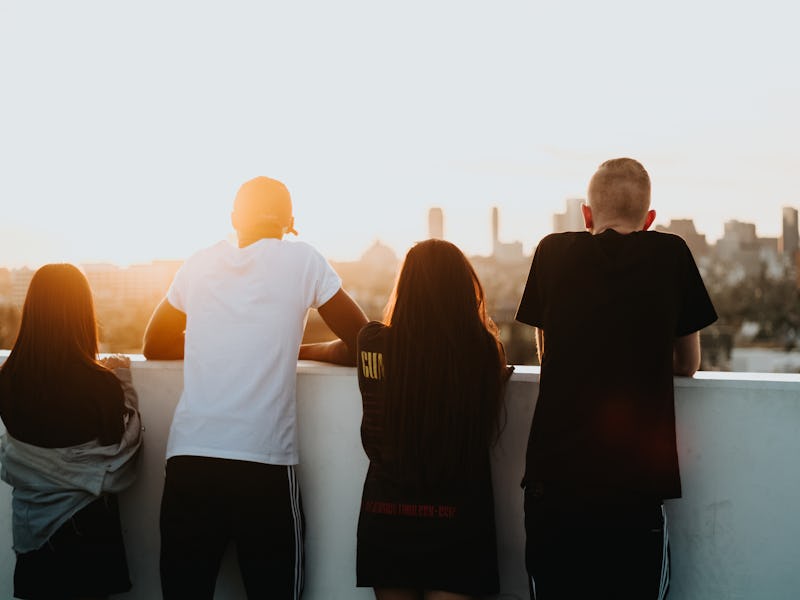Friends Who Are Hungover Together Say They Don't Feel the Painful Effects as Much
Misery loves company.

Headache and nausea aside, the morning after an evening of drinking can be filled with regret, anxiety, and misery. But it can also be a time of humor, story-telling, and emotional bonding.
This is what we found in a study examining the experiences of university students with hangovers. We asked them about their attitudes to being hungover — and the psychological and social effects on their lives.
Alcohol is a mood-altering drug. Intoxication can bring feelings of increased euphoria, relaxation, and positivity, while reducing anxiety and tension. These effects are part of what makes alcohol one of the most widely consumed drugs in the world.
Drinking can be a time of emotional bonding.
It is also a “biphasic” drug, which means it has two distinct phases of action.
The first, known as the “ascending limb,” brings positive and euphoric mood as the concentration of blood alcohol increases. The second phase, the “descending limb,” occurs as blood alcohol concentration decreases and is generally accompanied by feelings of fatigue and low mood.
A small body of research has begun to study the effects of hangovers on mood and emotion. In general, these studies indicate that hangover is associated with decreased positive mood and increased anxiety.
These findings have serious implications for those who may have hangovers while carrying out caring responsibilities — parents, nurses, doctors, and teachers, for example. But studies so far have been limited by simply asking individuals about their mood using questionnaires. Research using animals has been able to examine in more detail how socialization and engagement with others may be influenced by a hangover.
See also: “Beer Before Wine” Hangover Myth Finally Explained by Alcohol Researchers
A study of rodents showed that 18 hours after alcohol intoxication, the social behavior of rats is reduced. The experiment was also able to look at differences in social behavior between rodents of different ages. The adolescent rats engaged in more social interaction when hungover compared to the adult rats.
This finding suggests that adolescent rats might be less sensitive to the effects of alcohol hangover on anxiety and sociability. In our work researching young peoples’ experience of hangover and the relationship between hangover and drinking behavior, along with our colleague Maddie Freeman, we found that young people had a similar kind of tolerance.
All of the students we interviewed at a university in south-west England mentioned the psychological impact of hangovers. They spoke of feeling low, irritable, angry, sad, and lonely.
Hangover 101
But they also felt that reducing alcohol consumption was not an option for minimizing the effects. Hangovers were expected — and even planned for in their day-to-day lives. These findings are consistent with the animal research, suggesting a lesser impact for the youthful. For younger adults, hangovers may not be a powerful disincentive to heavy drinking.
We also found that some students actually considered hangovers to have a positive role in promoting group socializing. Communal experiences of a hangover were presented as beneficial — of suffering the symptoms “all together.”
About Last Night
Hangovers were viewed as a continuation of socializing from the previous evening, which included reminiscing about drunken activities from the night before. Similar to the adolescent rats engaging in social behaviors such as play fighting while hungover, it appears that for younger drinkers, a hangover is part of the social experience of drinking.
Universities have long been thought of as places where young people learn not just about their chosen academic subject, but also the effects of drinking alcohol. For many, having a hangover is part of the college experience.
Misery loves takeaways.
How it affects their actual studies, we cannot yet be sure. Recent research suggests that hangovers have a significant affect on how we carry out routine activities such as work and driving. On any given work day, around 200,000 British workers turn up to work hungover.
Nor is research into the social element of hangovers complete. Fittingly, perhaps, the overall effects on mood and interaction are not yet clear — blurry, even.
For some, hangovers are a time of psychological discomfort, accompanied by low mood. For others, they are an enjoyable extension of social drinking — when it really does seem that misery loves company.
Now watch this: Your Brain on Hangovers
This article was originally published on The Conversation by Sally Adams, Christine Griffin, and Paula Smith. Read the original article here.